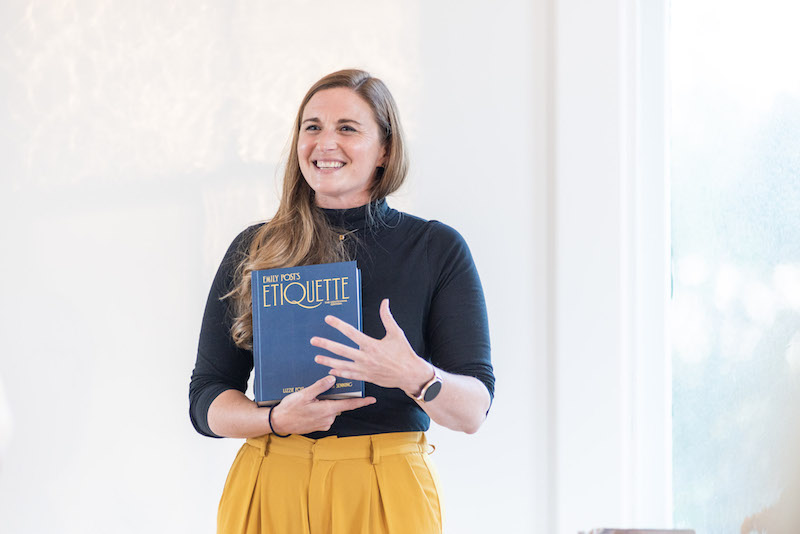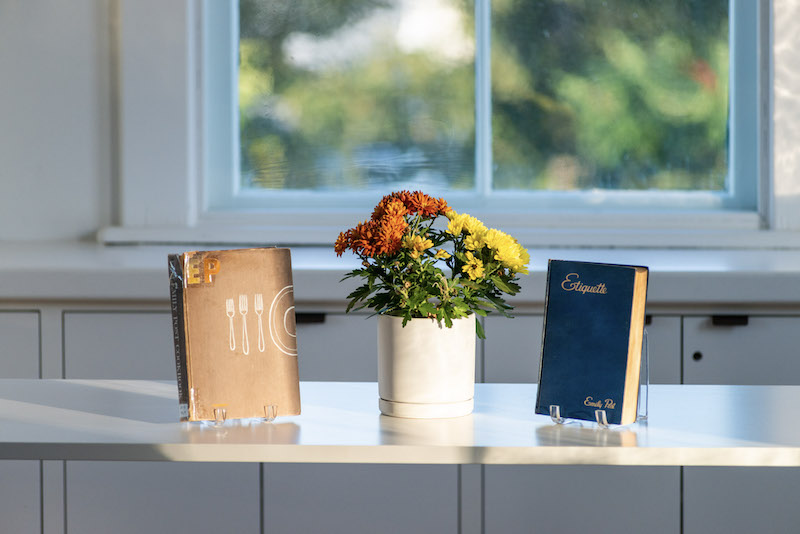At one point, Emily Post’s Etiquette was the second book most likely to be shoplifted from libraries. Number one? The Bible.
The longtime Edgartown summer resident set the standard for manners with her 1922 release, considered a near-sacred text in hostessing and homemaking circles. A century later, Emily Post’s Etiquette: The Centennial Edition, written by her great-great-granddaughter, Lizzie Post, breathes new life into the ubiquitous text.
“I firmly believe that etiquette is a living thing,” Lizzie Post told the Gazette during an interview at her family’s Edgartown home. “It isn’t dead... it lives in every positive interaction.”
The new edition, released in hardback on Oct. 4, includes updated guidance for the modern world, from conversations about mental health to how to nail a video call.

At her talk at the Martha’s Vineyard Museum on Friday — the book’s first public event — Ms. Post assured readers that the centennial edition of Etiquette stays true to Emily Post’s legacy even as it adapts to current parlance.
“One thing we really wanted to maintain is Emily’s humor and way of writing, from the nicknames she’d make up for people to her single-column format,” Lizzie Post said. “I really think of all the versions, this is the one that rings truest to the original.”
Ms. Post also acknowledged that while the specifics of etiquette may change with the times, she found that three foundational tenets guided every piece of advice.
“Consideration, respect and honesty were the backbones of etiquette across generations and cultures,” she said. “Failing that, a good apology is your escape hatch.”
The new book, she continued, is much less concerned with rules than it is about approaching interpersonal relationships with these three things in mind. That being said, the centennial edition provides ample guidelines on everything from tipping practices to social decorum for the digital age. It even includes a guide to gender-free attire and advice on how to ask someone’s pronouns.
“Emily was always looking to the next generation for her advice,” Ms. Post said. “If you listen to her radio show or read her columns, she almost always sides with the younger people.”
Born to the architect Bruce Price in 1876, Emily Post had not expected to be a working writer and media personality. Her social education came from New York high society, where she rubbed elbows with other Gilded Age icons such as Edith Wharton.
“Unexpectedly, she found herself divorced at a young age with two kids,” Lizzie Post said. “She thought she was going to be a wife and mother and hostess for the rest of her life, and instead she fell in love with work. She became the kind of classic career woman many of us know today.”
In 1927, after several trips to the Vineyard with her friend Catherine Collier, Emily purchased a summer home of her own at 34 Fuller street, which she frequented until her death in 1960. On the Island, Emily became just as known for her meticulous gardening and sky-high dahlias as she was for her writing career. In 2002, the Post family sold Emily’s original home but have otherwise kept ties and a home on the Island.
“We grew up with people taking pictures of our garden,” Lizzie Post shared. “My dad even started giving secret tours, to the surprise of my grandparents.”
Rising to the unexpected was something Lizzie Post experienced in her own writing career. Although she had updated Etiquette in previous editions and re-releases, the centennial edition was the first time the book had been rewritten completely from scratch. And most of that writing took place during a time when no one was socializing at all.
“Writing this book during Covid was the most bizarre experience of my writing career,” Ms. Post said. “Here I was writing about dinner parties and handshakes just hoping that people would still be doing them by the time the book came out.”
When she turned in the manuscript, it was spring of 2021 and widespread vaccination was on the horizon. To better update the new edition, Ms. Post and her publishers decided to weave in social distancing advice when applicable without calling specific attention to pandemic-era customs.
“Luckily for us, the handshake didn’t die,” she said.
The rewriting process also granted Ms. Post the opportunity to do some much-needed revisions, she said. Extraneous sections such as hiking etiquette or how to manage a chaperone were taken out, leaving eleven main chapters intact: general etiquette, greetings and introductions, conversation and correspondence, personal appearance and table manners.
The new edition has also been considerably slimmed down from the original’s 800-some pages, and includes a Thinking Forward section at the end, which Ms. Post said encourages readers to write in their own feedback.
“Emily was always talking to strangers to find out what the norm is, knowing that it would change,” she said. “We try to be a social barometer, not a dictator. You’re a lot more in control and participatory in this than you think.”
To help take that temperature today, Ms. Post hosts the advice podcast Awesome Etiquette with her cousin Daniel Post Senning, which she said allows her to stay up to date on current social dilemmas.
The weight of maintaining her great-great-grandmother’s reputation three generations later is not lost on Ms. Post.
“We’re very quick to admit that we’re only human,” she said with a laugh.
Her forward-thinking approach hasn’t come without a backlash. Her stance on gender and pronouns, she said, has invited the ire of Facebook trolls, but she hasn’t strayed from her core belief that especially in a time of mass communication, etiquette is as foundational for social interaction as it has ever been.
“It’s all about building relationships,” she said. “When you encounter something new and different, etiquette can be a guiding light.”








Comments (4)
Comments
Comment policy »